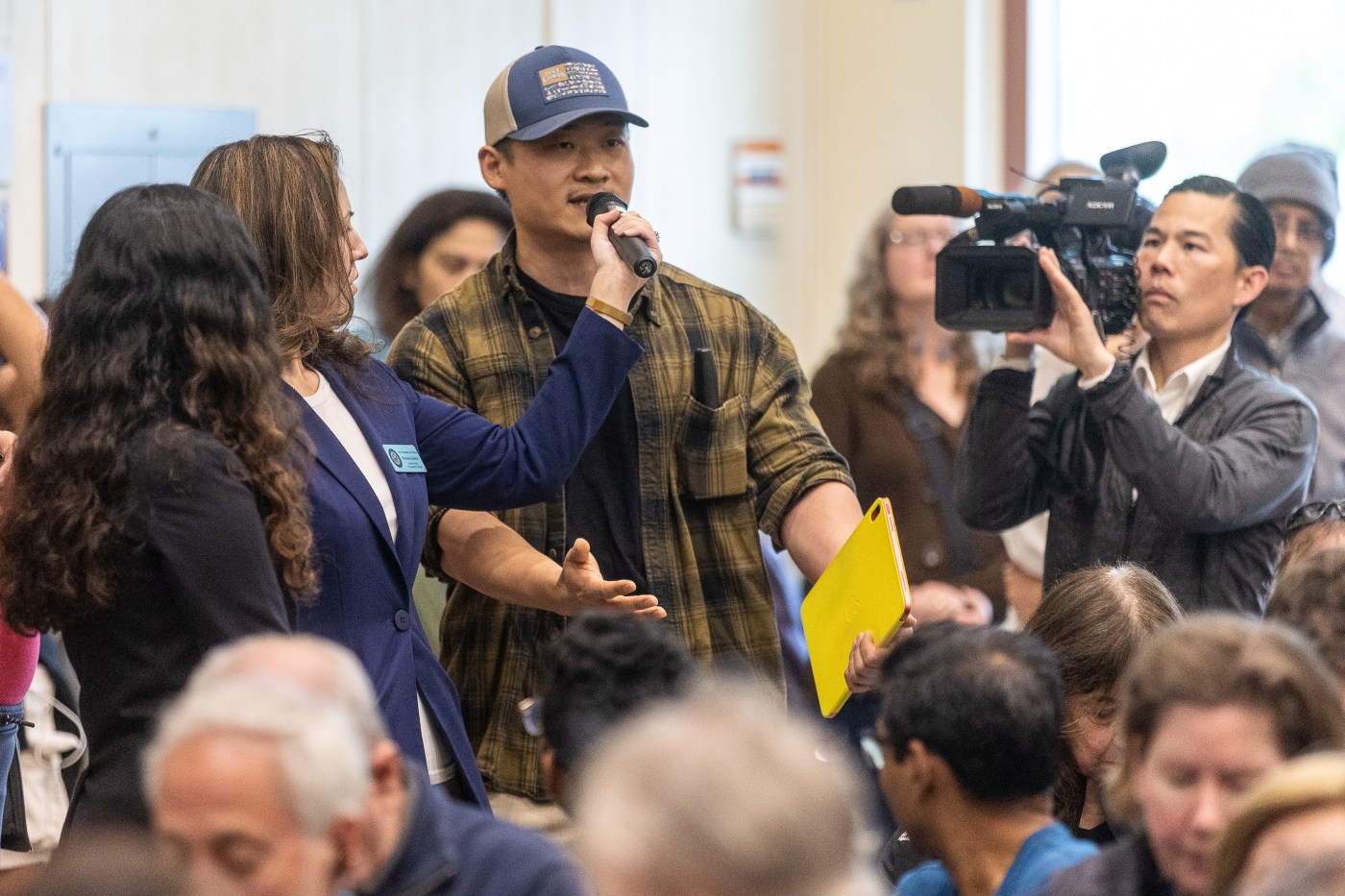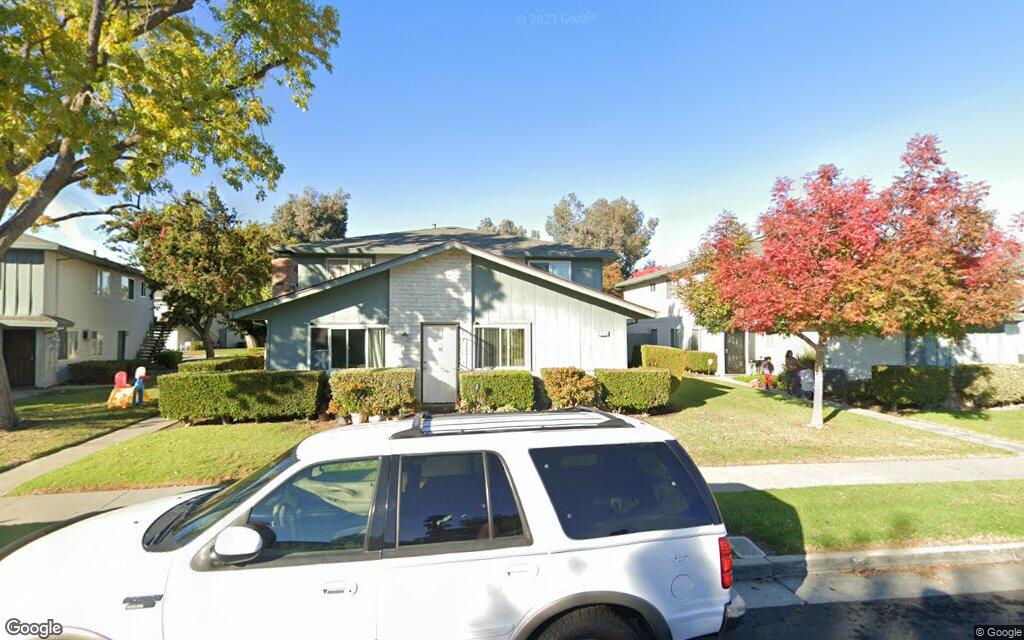SANTA CLARA — The day before U.S. Rep. Ro Khanna set out on a three-stop “Benefits over Billionaires” town hall tour of Republican-held congressional districts, hundreds of the Democrat’s own constituents packed a school gym filled with frustration.
In Khanna’s 17th Congressional District, which stretches across parts of Alameda and Santa Clara counties, nearly 49% of registered voters are Democrats — no party preference is the second-highest group at 30%. But the tone of Khanna’s monthly town hall on March 22, which saw a record turnout, reflected an overwhelming sense that many of those Democrats were feeling abandoned by their party.
Tensions bubbled over at Don Callejon School as attendees voiced their concerns about the Trump administration’s recent actions and executive orders and Elon Musk’s surging power in the White House.
“I was taught real leaders always lead from the front. Why are Democrats not doing that?” veteran David Tang asked Khanna. “I’m a longtime Democratic voter, but I’ve really lost faith in the leadership.”
As Democratic legislators look toward the 2026 midterms, still struggling to regain their footing following the November election, many are testing the waters at town hall meetings, a longstanding political tradition that seems to be having a moment not seen since 2010, when Tea Party members stormed town halls to protest the Affordable Care Act.
Related Articles
Why one California congressman split with his party on a bill to curb foreign influence in higher education
Opinion: California needs to think outside the blue box
Kitty Dukakis dies at 88; wife of one-time presidential candidate Michael Dukakis shared struggles with addiction
Will California Democrats defer to former VP Kamala Harris if she runs for governor?
Will she or won’t she? Retirement hovers over Pelosi, and her city
While Democrats have caught heat from their voters at these meetings — Khanna faced criticism last Saturday for his occasional defense of Musk, whose electric car company has a factory in his district — Republicans earlier this year faced anger from their own base at town halls. It’s led House Speaker Mike Johnson, a Louisiana Republican, and other GOP leaders to advise their members of Congress to stop holding them altogether, claiming without evidence that the turmoil stemmed from “professional protesters.”
Republicans’ pause on town halls has given Democrats, particularly those in the progressive wing of the party, an opportunity to organize in red and purple districts that will be the key to their efforts to take back the House in 2026. Khanna last weekend stopped in Bakersfield, Norco and Anaheim — cities that fall in the congressional districts of Republican Reps. David Valadao, Ken Calvert and Young Kim.
“In America, leaders aren’t supposed to hide from people,” Khanna told the Bay Area News Group in an interview. “I’ve been offended that Republicans have decided as a policy not to do town halls. Many of the people who are going to be most impacted by cuts to Medicaid are in some of these districts, so I thought I’d go and hear people out and give them a voice.”
David McCuan, a professor of political science at Sonoma State University, said that aside from Sen. Bernie Sanders, the Vermont Independent, there has been a “generational divide” among Democrats over how they respond to Republicans controlling both the White House and Congress.
Democrats who have been venturing into red and purple districts tend to be younger or political outsiders, he said. Sanders and Rep. Alexandria Ocasio-Cortez, a New York Democrat, recently embarked on the Fighting Oligarchy Tour, town-hall-style events that reportedly drew more than 34,000 people in Denver alone.
As Democrats “search for a message,” McCuan said that holding town halls in Republican districts “allows them to find that message or a place where they can have a moment for a message.”
“In the 2024 election, Democrats messaged on threat to democracy, they messaged on abortion, and voters seemed to be interested in affordability, inflation and the economy and immigration,” he said.
Khanna’s “Benefits over Billionaires” town halls target core issues that are at the front of many Americans’ minds: potential cuts to Medicaid, Medicare and Social Security. These issues will “energize voters” heading into the midterms, McCuan said.
“There was a lot of frustration that their representatives were not showing up, frustration really anger and emotion about the cuts,” Khanna said of the town halls. “A number of people were crying and hugged me just looking for reassurance.”
Republicans are currently looking to make $880 billion in budget reductions over the next decade, and doing so would require them to cut Medicaid — a federal health insurance program for low-income individuals and those who are disabled — and Medicare, which provides health insurance for those 65 and older. Valadao’s San Joaquin Valley district has the highest number of Medicaid recipients in the United States.
Back at Khanna’s Santa Clara town hall, he tried to reassure frustrated constituents who peppered him with questions about why Democrats aren’t acting with a greater sense of urgency.
“This is not a time where you can just vote or do the traditional speeches,” he said. “We need legislators to be activists just like we need citizens to be activists.”
Khanna told the crowd that he feels like younger members of the House are starting to understand what’s needed, but those who have been in Congress for a long time “are still stuck on niceties.”
U.S. Rep. Sam Liccardo, who replaced longtime Rep. Anna Eshoo earlier this year, is one of the newer members of Congress looking to step into a more active role. He’s planning a town hall meeting in a Republican-held congressional district somewhere in California.
As Democrats do not have enough votes to stop a Republican majority from “eviscerating Medicaid, Social Security and Pell Grants,” Liccardo said that they need help from Republicans “and that means we need the public.”
“I’m not Beyonce, so I’m not expecting to draw 80,000 people,” he said. “What I am hoping to do is to work with local nonprofits and organizations in those communities that want to mobilize people to talk to someone in Congress at a time when Republicans are not holding town halls because their leadership is telling them that they should not do so.”
Dan Schnur, a former GOP political strategist who worked on John McCain’s 2000 presidential bid and served as a spokesperson for former California Gov. Pete Wilson, said that it’s a “very effective strategy for Democrats” as it’s a “no-lose situation.”
“At best, you’re reaching out to new voters; at worst, you’re rallying your own base,” he said.
Schnur described Republicans’ decision to skip out on town halls as “smart” in the short-term, noting that a “small unfavorable story about the lack of an event” is better “than holding one that goes badly and generates much more negative attention.”
“Ultimately, most voters are less concerned about town hall meetings than they are about their ability to pay the rent and feed their families,” he said. “If the economy grows under Trump, then Republicans will escape any significant downside. If the economy turns bad, then all the town halls in the world won’t save them.”





